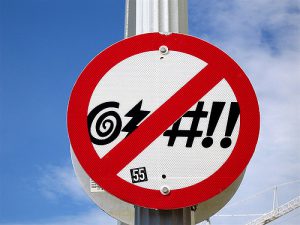By Robine Jean-Pierre
It is 11:40 pm on a Saturday evening. I worked from 5:00 to 9:20 pm on the audio/video crew for the Haunted Hotel, City Tech’s annual Halloween-themed attraction. I worked the same shift yesterday. Working on in-house shows and events is required for my technical production class, and inevitably takes away more time from an already jam-packed schedule.
It has been yet another long week of juggling six classes (17 credits) and two part-time jobs. We are about halfway through the semester and I have had a handful of anxiety attacks and emotional breakdowns. I have missed assignments and (very few) classes. I have wanted to cut my hair, or even tear it out; break computers; fling chairs; scream, kick, stomp, and curse out everyone within close range. I have wanted to drop at least one class even though the deadlines are long past. I have been playing a never-ending game of catch-up, handing in the lab report that was due last week this week, pushing off what’s due tomorrow because of what’s due in two hours, only to find that when tomorrow comes there is no time left. I have sat at a desk in front of a computer for hours, with the earnest hope of getting it all done in one shot, and next thing you know, my time is up and I have nothing to show for it. Nothing. NOTHING.
I have an overdue lab report and the current one to complete by Monday morning, not to mention an elaborate assignment for my theatrical drafting class that involves a software called AutoCAD, which I do not own at home because none of the laptops would be able to handle it. I don’t think the computer labs are even open on Sundays. Then there’s this very blog post that I am writing, also due Monday. My draft was supposed to be in since Tuesday, going by the guidelines, although Thursday has been a reasonable compromise for me and my fellow peer-reviewing blogger. I’m sure she’s tired of me failing to reach even that agreement.
I am not trying to brag about my struggles as we often do, hoping for a pat on the back for our valiant efforts or some sympathy to liven up the pity-party. It’s just that everything I have written so far is all I have been able to think about for a long time. I am hardly able to think straight and I felt like I would have gotten nowhere if I had tried to write about some topic that, let’s face it, I don’t even care about right now. (Believe me, I tried. It didn’t work.)
Even as I write this out of obligation (blogging is my job and as I said, my posts go up on Monday), I feel guilty being up this late, 12:07 a.m., writing this sob-story instead of completing my lab reports, at least. But honestly, it doesn’t matter how I arrange all my responsibilities on my priority list–it all has to get done, whether I work on something first or second or last.
On a deeper level, I have to do this. Not just because I signed up to be a blogger, not because of the paycheck. I need to write. Writing helps me to take the emotions and thoughts running around like chickens with their heads cut off, as they say, and line them up for inspection. Writing allows me to drain my mind of all the excess content, whether benevolent or noxious, although I have found that I will more readily write about a negative experience than a positive one. I know how to deal with happiness pretty well; I feel no need to transcribe it, no need to analyze it–it’s self-explanatory, and simple, and beautiful. But when turbulence comes and I’m overwhelmed with sadness or anger or guilt, writing is like the chisel that allows me to carve the masterpiece out of a hulking, rough, ugly chunk of faceless stone.
I write because it gives me healing, relief, satisfaction, and a deeper understanding of myself and my circumstances. It gives me a space to express myself without alarming anyone. I am writing this for an online audience, sure (and chances are that few people will read it, like my last eight posts) but I am writing this primarily for myself. I am the author, and that makes gives me the authority to say whatever I want to say, whatever I need to say, without feeling embarrassed or intimidated or worried about what other people might think. If I were to scream in the middle of a classroom and start pulling my hair out, that would worry people, for sure–but I could choose a better option and let these letters be my voice, and this post a scream, and at the same time, a sigh of relief. Writing keeps me sane.





